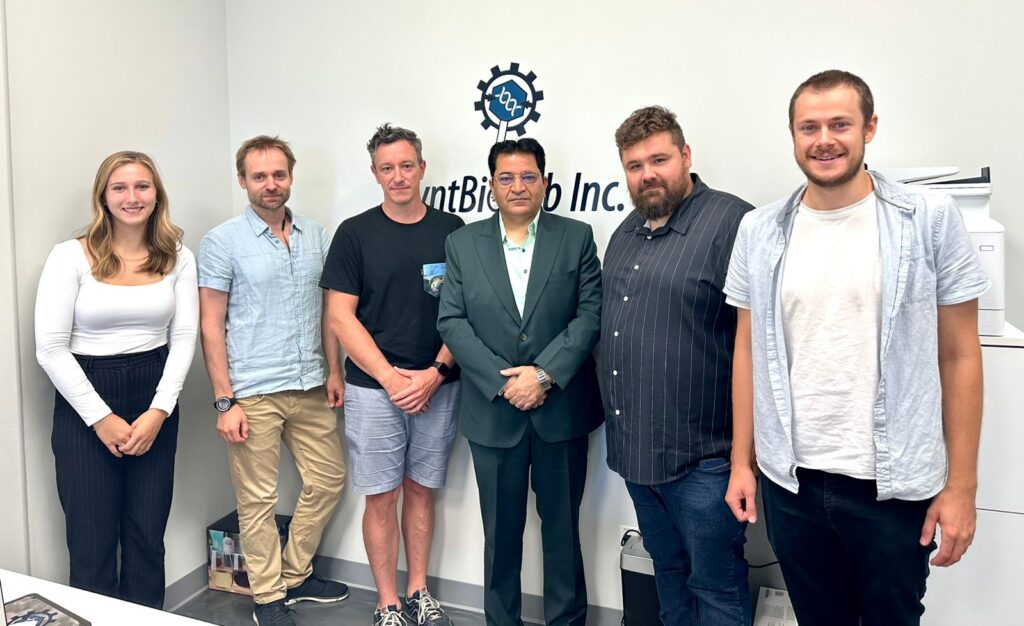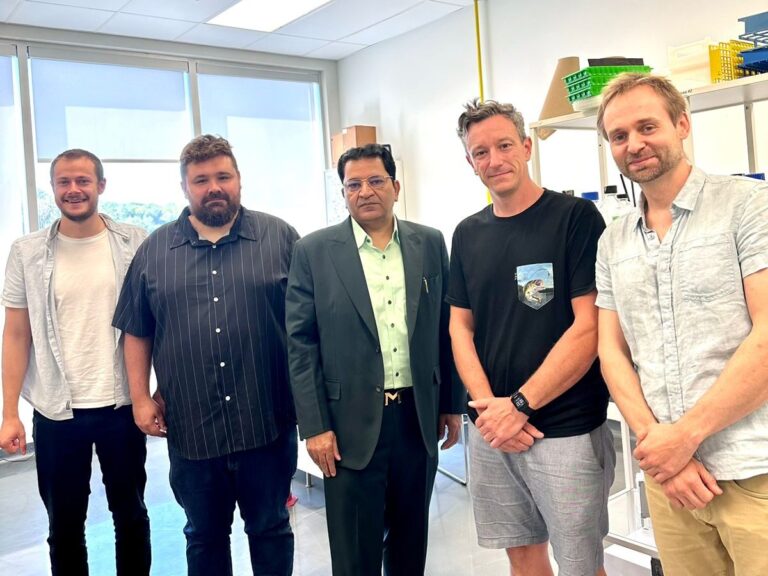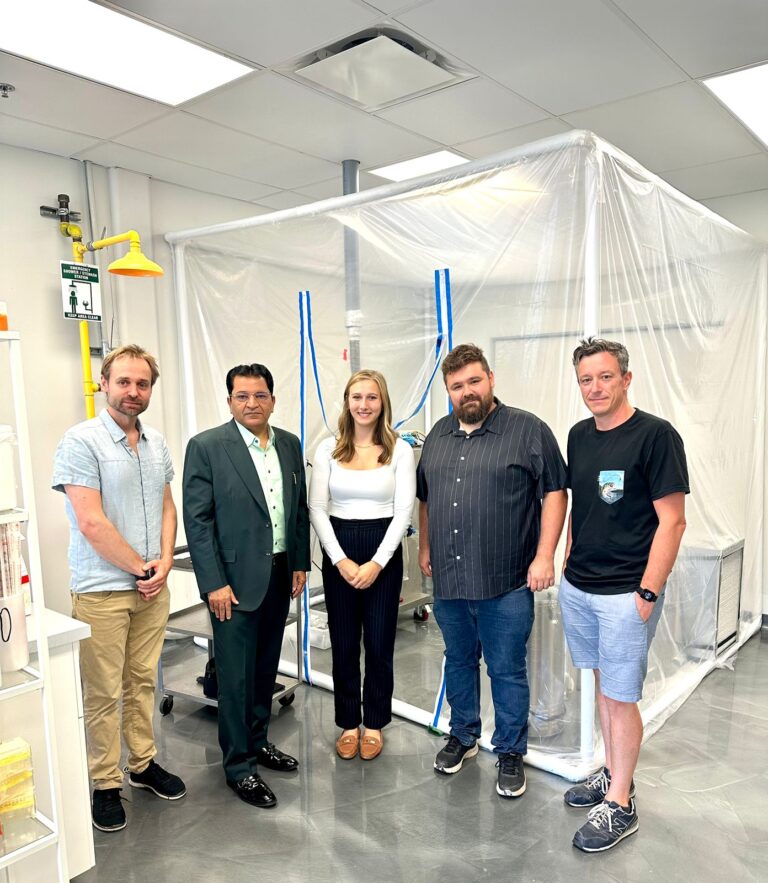Article by Mr Ricky Thaper
Published on October 1st, 2023
SyntBioLab, based in Levis, Quebec, Canada is doing pioneering work in providing alternatives to antibiotics for healthy growth of the livestock sector. After strengthening its presence in Canada, USA and Europe, the company is looking to expand its presence in Asia including India.
Antibiotics have been used for the past many decades in rearing poultry birds. Global livestock production continues to witness robust annual growth annually as the industrialised model of livestock and fish production spreads to several continents including Asia with poultry accounting for an increasingly large share of meat production globally. However antimicrobial resistance is emerging as a key issue in the poultry industry. It is this growing use of antibiotics that has resulted in increased concern over the development of antimicrobial resistance (AMR) in the poultry industry. Over consumption of antibiotics in animals raised for meat is linked to an increase in antibiotic resistant infections not only in animals but also in humans and in the environment.
During my recent visit to Canada, I had an opportunity to visit the state of the art facility of SyntBio Lab Inc based at Lévis, Quebec, Canada, a bioengineering company that develops alternative antimicrobials against pathogenic bacteria affecting livestock. The company set up in 2014 uses bacteriophages to fight bacteria infecting livestock. They provide animal health and public safety by avoiding antibiotic resistance. It uses bacteriophages to fight bacteria infecting livestock including poultry birds. They provide animal health and public safety by avoiding antibiotic resistance. The company focuses on the development of natural, unique, and innovative solutions that are effective solutions that address the issue of concern. SyntBio Lab has a strong culture of excellence that is transposed by its team to its high-added-value products for the industry

Many facets of human life are affected by bacterial pathogens. Bacteria can cause both animal and plant diseases. Extensive use of antibiotics to contend with pathogenic bacteria has resulted in an increase of multi-resistance to antimicrobials. Even when antibiotics are used vigilantly, their application in poultry or other fields of animal production can lead to increased spreading of drug resistance. Natural adversaries of bacteria – bacteriophages – are now considered as an alternative to antibiotics. Reducing use of antibiotics is also important as decreased use of antibiotics in livestock should limit increases in emergence antibiotic resistant E. coli and other bacteria associated with foodborne infections in humans.
As the industrial partner, SyntBioLab pursues the possibility of upscaled production and marketing of such a product. The company says that the isolation of such bacteriophages and development of an effective alternative to antibiotics would be a definite benefit to the partner organization. The company is led by very experienced and passionate Mr. Rodrigue Dubar, President and Chief Executive Officer of the board and founder since 2013. He holds a Bachelor of Applied Science, Biochimie from University of Laval, Quebec, Canada.
According to Mr. Dubar, the project by SyntBioLab Inc is to identify and characterize bacteriophages (bacterial viruses) that can reduce the presence of E. coli bacteria that are an important cause of disease and production loss to the poultry industry. The reduction of levels of E. coli that can cause disease in poultry by use of bacteriophages would be an important means of controlling this economically important disease and also reduce use of antibiotics to control such infections.

The company’s alternatives to antibiotics use bacteriophages offer high-rate metabolic optimization services related to industrial microorganisms, enabling scientists to develop new bacteria strains that improve manufacturing processes, especially in the dairy industry, protein production, and bacteriological population biocontrol. Mr. Simon Labrie, Chief Scientific Officer and partner with the company, was a postdoctoral fellow at the Chisholm Lab, Massachusetts Institute of Technology and holds Ph.D. in Microbiology from university of Laval (Quebec), has nineteen years of experience in phage research. He is currently designing phage-based solutions to provide alternatives to antibiotics for the livestock and food industry. Mr. Labrie updated that Lytic bacteriophages (phages) are bacteria-specific viruses that can lyse and kill their bacterial targets. Unlike antibiotics which show broad range killing, bacteriophages only kill specific bacterial species or strains, and are harmless for others. One of the focuses of the company is to develop applications to control bacterial pathogens by using phages. Escherichia coli is a major problem for food safety and animal health. In particular, in poultry including chickens and turkeys and other species, avian pathogenic Escherichia coli (APEC) is the predominant cause of respiratory and systemic infection.
Mr. Viacheslav Liato, Ph.D, Production Manager and Mr. Nicolas Lemire, Project Manager have been passionately working towards expanding the company’s presence across the globe. Primarily, SyntBio Lab’s solutions aimed at limiting the impact of Escherichi coli in the poultry productions. Mr. Liato said that Bacterial pathogens of importance to animal health and food safety have major impacts on agriculture and food industries across the world. There has been an increase in bacterial resistance to antimicrobials, and antibiotic use in the livestock and poultry sector. The phenomenon is attributed to the likelihood of increased antimicrobial resistance. Alternative strategies to contend with bacterial pathogens within the food production chain are therefore needed.

Ms. Julianne Langlais, Business Development Director of the company is wholeheartedly pursuing expansion of the company around the globe. Ms. Langlais updated that the company has also filed a patent application on the subject ‘Bacteriophage composition and method of preventing bacterial infections in livestock,’. After establishing itself in USA, Canada and European markets, the company is looking at expanding its products presence in Asia countries including India.
As the Indian poultry industry is growing at around 7-8% annually, to protect poultry birds against AMR, the solution provided by the SyntBioLab Inc could help the sustainable growth of the Indian poultry sector. Mr. Rodrigue Dubar, President informed that the company is seeking to work with Indian counterparts to expand its presence here and to help poultry, dairy and aqua farmers in productivity enhancement through unique products which improves poultry birds’ health.

Copyright © 2022 SyntBioLab INC. All Rights Reserved.